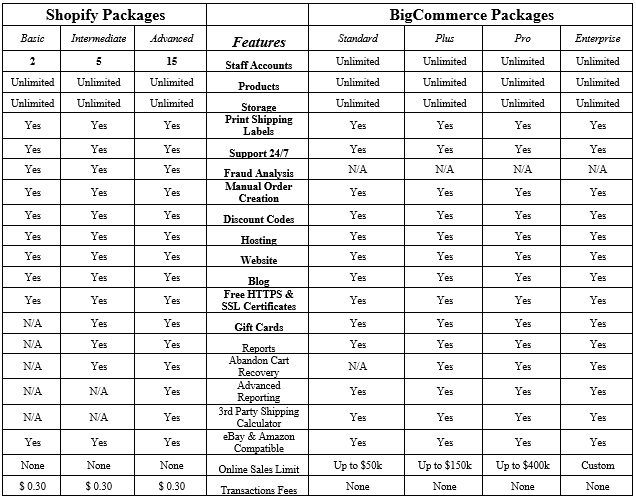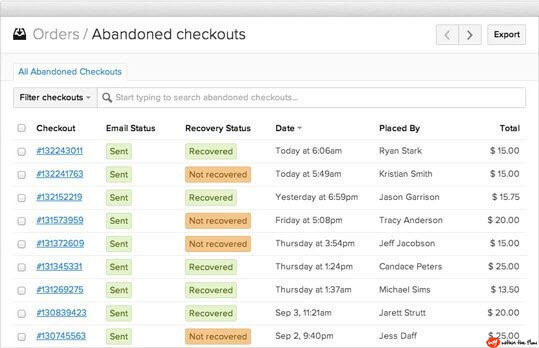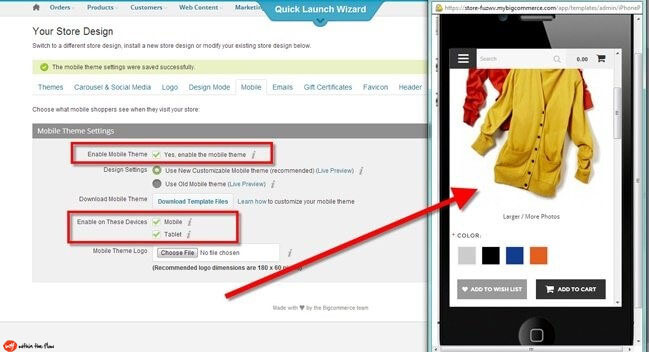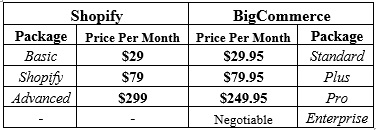Shopify vs BigCommerce Reviewing the Best eCommerce Solutions 2021
- Jan-01-2021
- Ameer Rizvi
- 2 comments
Shopify truly revolutionized online shopping, completely changing how eCommerce stores are built and managed. After 11 years of innovation and research, new eCommerce platforms are constantly emerging, most similar to Shopify.
Shopify has been compared to several eCommerce platforms, WooCommerce being the most popular in comparison. Recently, Shopify vs BigCommerce 2021, has become a frequent debate among online store owners.
- Ease of Use Shopify vs BigCommerce
- Shopify vs Bigcommerce Theme Templates
- Abandon Cart Recovery of Shopify vs Bigcommerce
- Shopify vs Bigcommerce App Store
- Mobile Compatibility of Shopify vs Bigcommerce
- Shopify Vs BigCommerce Support & Community
- Shopify vs BigCommerce Hosting & Security
- Shopify vs BigCommerce Pricing Comparison
- BigCommerce vs Shopify Reddit Comparisons

Shopify vs BigCommerce Ease of Use
So we begin the Shopify vs Big Commerce debate by comparing the ease of use for both platforms.
Shopify
Shopify is probably one of the easiest eCommerce platforms out there. Powered by its own content management system (CMS), e-store apps, and analytics panel.
Shopify makes online store creation pretty simple, making it a five step process. You start by clicking the Get Started button on the homepage, which takes you through the online wizard to do the rest. Next, select the online store type you require from either Online Store or Pop-Up Shop, followed by registration.
Once registration completes you are taken to the Shopify dashboard to add your first product. This is followed by theme selection, for which Shopify offers a selection of free templates to get you started. Next comes domain setup that requires linking an existing domain to Shopify. Finally, its time to choose a payment processor, either Shopify Payments or 3rd party processors.
This completes a simple e-store design and launch, allowing you to start with Shopify’s 14 day trial. The Shopify dashboard enables you to customize several background features that include:
- Product images and Descriptions
- Inventory Management
- Product Categorization and Collections
- Discount Code Management
- Creating and Managing Blogs
- Order Tracking
- Payment Processors
- Real Time e-store Analytics
- Multi-user Access and Control
BigCommerce
Creating and launching an eCommerce store with BigCommerce is not too different compared to Shopify. With more or less the same features, BigCommerce allows an automated wizard to help you with the nitty-gritty.
You start off by creating a BigCommerce account, brilliant aspect no Credit Card is required. Then comes business registration information, allowing you to describe yourself & your business. Once registered you will see a “Your Store is Ready!” message with a Visit store button, click it. You will be taken to your BigCommerce dashboard.
You will notice in your dashboard that BigCommerce has already finished some of the tasks automatically. Next, click Settings (left hand menu) and go to design, this will take you to theme template selection. Once completed its time to add- products to your store and see if the theme complements your catalogue.
Finally, you select a payment gateway, with the option to choose between both offline and online payment methods. BigCommerce comes with massive customization tools to manage:
- Create unlimited products – Customize price, weight, image & inventory levels
- Define Product Rules – For instance, free shipping for orders over $100 or 1 item free with 2 of the same
- Digital Products and Services (music, eBooks, images, videos)
- Product Categorization
- Order Management and Processing – Invoicing, Tracking, and Delivery
- Inventory Management
- Product Returns Management
- Payment Processing from multiple Merchants
- Real time Store Analytics
- Buyer Statistics & Analytics – Identify top customers and sales by person
Shopify vs Bigcommerce Theme Templates
Shopify Theme Template

Shopify provides a massive selection of store themes with a mix of free & paid templates. The brilliant aspect of Shopify theme templates is that they are sorted by industry, trends, inventory size, imagery, and style. Over one hundred mobile optimized themes are available to demo on Shopify.

Shopify keeps the element of ‘free’ in their themes, allowing everyone to get a taste of their services. It is also a brilliant starting point for newbies who wish to try out different themes at different stages of their e-store life. Then there is the selection of premium themes offered with added backend options and features. Discover the huge collection of Shopify themes on their official store. There is a superb selection of 10+ free themes, while an excellent range of paid themes is available for ideal prices.
Shopify also encourages developers to sell themes or publish them for free on the official theme store, so for those interested can definitely have a look at that.
Big Commerce Theme Template
Compared to Shopify, BigCommerce offers a smaller range of e-store themes to use. This lack of options also reduces the number of free themes available to eCommerce entrepreneurs. Themes are brilliantly sorted by catalogue type and by industry for easier user selection. There are only 7 free themes, while there are over 50 paid themes to choose from.
In my personal opinion, Big Commerce themes are not really as attractive as their Shopify counterparts. For those with a budget, they aren’t too financially attractive either. The presentation and display of the Big Commerce theme store is however much appealing than Shopify.
Shopify vs BigCommerce Abandon Cart Recovery
Abandoned Carts are a pain, it’s a recognized and rearched fact that e-stores need to be prepared for from day one. Between 67% – 78% of online shoppers abandon their carts and never return, the Baymard Institute reports. Most beginners never look to address this issue, hence losing out on potential profits.
Shopify Abandon Cart Recovery
Shopify offers abandon cart recovery tools in its “Shopify” and “Advanced Shopify” plans. Cart recovery recalls buyers using their emails, contacting & attracting them with offers to complete the purchase. The Shopify dashboard offers a real time cart status reports, informing the e-store owner of completed and abandoned carts.
When a buyer returns, their cart is recovered by cross referencing it with their email. This automated process allows e-stores to recover upto 38% of their abandoned carts. New e-store owners using the basic package from Shopify will have to invest in a 3rd party app for abandon cart recovery since the in-built feature is available with the two premium plans.
BigCommerce Abandon Cart Recovery
In the Shopify vs BigCommerce battle, Big Commerce loses out on providing a built in solution for abandoned carts. Yes, you will be required to invest in an app to manage abandoned carts which usually comes with a cost.
Shopify vs Bigcommerce App Store
Both Shopify and BigCommerce offers a dedicated app store for their users. While creating eCommerce stores with both platforms is fairly easy, the management of e-stores requires apps to support functional areas. These include the likes of SEO, marketing, inventory, invoicing, finance, and sales.
Shopify App Store
Being the more popular of the two, Shopify offers a wider variety of apps for eCommerce stores. There are now over 1500 apps to support e-store owners with different functional areas. Shopify offers apps to manage:
- Sales
- SEO
- Marketing
- Social Media
- Inventory
- Finances & Book Keeping
- Customer service
- Oder fulfillment, and
- Delivery & Shipping
While Shopify offers all the basics in its leading edge dashboard, some tasks will require an advanced app to accomplish successfully. The most popular apps on Shopify are those for SEO, Social Media, Financials, and Inventory Management.
BigCommerce App Store
BigCommerce also offers a selection of app categories in its app store allowing sellers the freedom to automate routine daily tasks. The BigCommerce subscription offers a very basic set of tools to launch an e-store, all else is dependent on readily available apps.
The BigCommerce app store is also properly categorized with real time app ratings, apps include:
- Accounting & Tax
- Analytics & Reporting
- B2B/Wholesale
- Catalog & Order Management
- CRM & Customer Service
- Data Transfer/Migration Services
- ERP
- Marketing
- Merchandising
- Mobile
- Payments & Security
- Product Sourcing
- Sales Channels
- Shipping & Fulfillment
- Site Tools
There is a good mix of free and paid apps so both new e-stores and established ones can make use of these clever tools. There is however my concern, that BigCommerce develops in to a much expensive solution with its very pricey apps.
Shopify vs Bigcommerce Mobile Compatibility
Mobile is taking over, we already know that. How does your e-store match up when it comes to delivering service over mobile? The answer really depends on the platform you are using, so let’s see who wins the Shopify vs BigCommerce mobile compatibility battle.
Shopify Mobile Compatibility
All Shopify themes are built from mobile and up, this means your e-store will work seamlessly no matter which device your buyer is on. All themes created to fit mobile, tablet and desktop screens to provide the optimal shopping experience. The great aspect here, all free & paid Shopify themes are compatible with mobile devices.
The icing on the cake is not really that your eCommerce store is mobile responsive, but you can also manage your e-store with a smartphone. Yes Shopify provides you with all the tools to manage:
- Sales,
- E-Store Analytics,
- Customer Data,
- Manage Orders, Plus
- Many other features directly from a mobile phone.
BigCommerce Mobile Compatibility
BigCommerce also offers vast mobile compatibility with all its themes, allowing you to switch the mobile & tablet website feature on and off at will. The dashboard also provides an option to watch your website in mobile view ensuring elements are in sync with the device. There is however the issue that only developers can edit the code for BigCommerce mobile.
Unlike Shopify, BigCommerce do not offers mobile app to manage e-stores from a mobile device. The provider previously had an app to manage various areas of your e-store, but was recently discontinued.
Shopify Vs BigCommerce Support & Community
Both Shopify & BigCommerce offer an excellent support platform for new & advanced shop owners.
Shopify Support & Community
Shopify powers over 500,000 e-stores with its superb eCommerce platform. As you would imagine, it requires an up-to-the-minute and interactive support service to cater to their huge user base. Shopify offers support through:
- Live Chat – Available 24/7
- Email Support
- Phone Support – For North America, United Kingdom, Australian & New Zealand only
- Video tutorials
- Shopify Community
- Webinars
The ideal way to contact the Shopify support team is through their Live Chat. The service is available throughout the day, so no matter where you are help is always available in the bottom right corner. Phone support is only available in 4 regions during office hours, while email support requires upto 24 hours to respond.
Shopify boasts a huge community of entrepreneurs and professionals to help you out in case of a problem. Available through the Support tab in the main navigation, you can visit the community and present your issues before a huge populace of experienced eCommerce store owners.
Shopify also offers beginners brilliant support through its video tutorials section, the official Shopify YouTube channel. Everything from launching your store, installing apps, marketing your e-store, and other miscellaneous topics are discussed this section. Another interesting aspect of support are the routine webinars organized by the platform. Experts and gurus are invited to speak on different areas of eCommerce.
BigCommerce Support & Community
Customer support at BigCommerce is simply better, primarily because the platform misses out on a massive community like Shopify. BigCommerce support is available through:
- Live Chat – Available 24/7
- Email – Available 24/7
- Phone – Available 24/7
- Knowledgebase
- Guides
- Documentation
- BigCommerce University
- BigCommerce Community Forum
Unlike Shopify, BigCommerce phone support is available in USA, Canada, New Zealand, Australia, UK, Singapore, Malaysia, Indonesia, India, and the rest of the world. There is a dedicated phone number for each aforementioned region.
BigCommerce also offers beginners an extremely helpful knowledgebase to quickly get solutions to issues. The knowledge base is made up of documentation (illustrated text manuals) to answer all questions & troubleshoot issues; plus, guides to launch, manage, and grow an online store.
Then comes in the 101 guides, prominently known as BigCommerce University. This is the first section of the website an eCommerce newbie or wantrepreneurs should look at first. Tutorials are available in both text and video format to ensure no one is left without proper guidance.
Finally, we come down to the BigCommerce community, powered by eCommerce experts and professional e-store owners. This is the best place to get real time help for issues unavailable in the support center. You have the option to search for topics directly in the community
Shopify vs BigCommerce Hosting & Security
Shopify Hosting & Security
Shopify’s monthly subscription also provides complete hosting service to e-store owners with a registered domain. The brilliant aspect, there are no limits of bandwidth or visits for store hosted through Shopify. For your subscription you will get superb service from Shopify as it manages your security, upgrades, and scaling the website to stay online 99.99% of the time.
Security is of great concern to Shopify management, hence all hosted e-stores are PCI Level Compliant. Also, shopping carts are secured by a 128bit encryption SSL Certificate, ensuring top notch user data security. All e-store data is backed-up on a daily basis automatically, ensuring you have backup data ready in case of a cyber-mishap.
BigCommerce Hosting & Security
BigCommerce offers exactly the same service as Shopify for hosting e-store. Powered by unlimited bandwidth and real time scalability, the entire service is accommodated in your subscription. While you are busy marketing, conducting SEO audits, and reaching out to audience on social media, BigCommerce handles all hosting services automatically.
BigCommerce constantly maintain servers with routine technical & security updates providing great peace of mind. Security is exactly the same as Shopify provides. All hosted e-stores are PCI Compliant, while all data is encryption with SSL 128bit encryption. Also, like Shopify, all data is backed up automatically every day.
Shopify vs BigCommerce Pricing Comparison
In the Shopify vs BigCommerce battle, it really can’t be decided by the pricing of the two services. Pricing for both platforms is as follows:
There isn’t much of a price differential when we pit Shopify fees vs BigCommerce price. It’s not until we look at Shopify Advanced and BigCommerce Pro packages that a $50 differential emerges. Shopify monthly fees is however justified by a fully integrated platform with social media, great ease of use, and a highly compatible backend dashboard.
Do remember here that BigCommerce enterprise pricing must be negotiated. You can discuss the features, the tools, and other essentials that will be frequently used. You can also negotiate other elements like shipment, fulfilment, payments, and financials too for your subscription.
In addition, another difference you will notice is when choosing the payment gateway with both services:
Shopify credit card fees have changed over the past few years after the platform abandoned PayPal and chose Stripe as the official payment merchant. Now termed Shopify Payments, the platform allows stores to accept all major credit cards (VISA, MasterCard, JCB, Discover, American Express, and Diners Club). There is an additional Shopify transaction fees for adding PayPal and other payment merchants.
Shopify merchant fees and transaction fees are also separately mentioned. For every transaction you will pay a maximum 2.9% Shopify transaction fees (depends on subscription), while $0.30 Shopify merchant fees in added to the cost of goods. Similarly, BigCommerce carries the merchant & transaction fees.
BigCommerce offers nominal Credit Card rates, but is powered by PayPal. On the other hand, Shopify uses Stripe as the default payment processor. The astonishing fact here, both platforms offer exactly the same transaction fees, so if you ask me there is no winner in price. I do consider that Shopify is the winner considering it offers more value for the subscription cost.
BigCommerce vs Shopify Reddit Comparisons
Browsing through Reddit I was amazed at the number of comparisons and threads that were exploring both platforms. eCommerce is big when Reddit users are swarming the public forum for support. Reddit currently one of the most popular internet communities, is a great place for real time reviews for eCommerce newbies.
The thread from canirank_mel has a great conversation debating Shopify vs BigCommerce. The comments offer excellent real time user feedback for both platforms and offer insights about other lesser known eCommerce service providers. The thread does identify that Shopify is a prominent solution for new e-stores and for those looking to launch their first eCommerce store.
Another great thread to visit is from Reddit user memelia, where the discussion specifically covers the BigCommerce vs Shopify debate. An excellent expert discussion leads to the conclusion that Shopify is the better of the two options. At the bottom of the comments section is another brilliant comparison of four popular eCommerce platforms.
User Charmandick’s thread is also a great place to get an idea when it comes to a development point of view. Several developers establish in the thread how Shopify is much easier to work with, while BigCommerce has a lack of developers for innovating the service. Similarly, this thread from user WalteryGrave also identifies the ease of development options in Shopify.
Apart from the top ones listed above you can find a long list of BigCommerce vs Shopify comparisons. Although most comparisons are from developers and eCommerce professionals, the comments sections are the most valuable for any eCommerce enthusiast. Do read through the comments and you will have most questions answered.
Reviewer’s Verdict
Shopify vs BigCommerce is a good comparison indeed but a head to head comparison reveals one winner, Shopify.
Verdict – Ease of Use
Both Shopify and BigCommerce are fairly easy to setup. Creating your e-store is almost the same, and both probably use the same CMS solution. Customization features are exactly the same, making it really hard to choose a winner here. In addition, both platforms give you the option to maintain a BLOG, which is great news for marketing.
Verdict – Backend Development Needs
BigCommerce, I noticed had some backend development errors and lack of support for unique issues. A great place to understand these problems have a look through the various Reddit threads mentioned below. Shopify on the other hand has been acclaimed for its stable & reliable backend, requiring almost no development knowledge to operate the e-store.
Verdict – Themes
While both platforms offer theme templates, the Shopify vs BigCommerce challenge is won by Shopify. The sheer number of themes both in the free & paid categories simple overshadows what BigCommerce has to offer. BigCommerce also has more expensive themes compared to Shopify. Especially with some important features missing, it is not worth splashing out cash on a new store with BigCommerce.
Verdict – Cart Recovery Tools
The abandon cart recovery feature available in both Shopify & Shopify Advanced packages where the platform wins the Shopify vs BigCommerce debate. Basic users can definitely install free or paid ads to do the job, however the feature is already available in Shopify’s intermediate & advanced packages. BigCommerce loses out in this comparison, since there is no tool in any package for cart recovery.
Verdict – Apps & App Store
Although both platforms offer apps to manage & maintain ecommerce stores, there is a massive difference in the number of apps on each. Shopify now offers 1500 apps in 9 categories, while BigCommerce offers a much smaller selection of less than 300 apps. Even without the numbers comparison, Shopify apps are much cheaper and offer better pricing. BigCommerce apps are also ridiculously pricey, some even going up to $300 per month.
Verdict – Mobile Compatibility
With all the talk about mobile compatibility, Shopify offers themes designed to fit from mobile screens and up. BigCommerce however requires an additional step to launch mobile & tablet versions of your e-store. Although both eCommerce platforms offer the feature, it requires hands on testing to choose a winner from the two. Do remember to share your experience if you have published a mobile e-store with either service.
Verdict – Support
Both Shopify and BigCommerce offer support through multiple channels. I like that both platforms offer phone support, but it is their educational materials & tutorials that take the cake. But even with all the amazing information provided by BigCommerce, Shopify still wins this head to head comparison. The variety of the knowledgebase, tutorials, guides etc. at Shopify have no comparable, with years of experience behind all the knowledge.
Verdict – Pricing
Let’s come down to the final showdown then, the pricing. In the battle of Shopify vs BigCommerce I would definitely vote for Shopify, but, it’s too similar to even call a winner. Not only are prices very close, but card fee for transactions and theme template prices are also very close. One area where BigCommerce loses out is, price of e-store add-ons. With fewer add-ons, BigCommerce were already at a massive disadvantage compared to Shopify. Higher prices for comparable add-ons simply hands Shopify the winner’s trophy.
See You Again Soon
So, there you go, we have chosen a winner and it’s Shopify. After a careful surgery of both eCommerce platforms we found there is a lot similar between the two providers. We saw how most BigCommerce features have been inspired by and adapted from Shopify. Notice that even the pricing has been setup to be very competitive.
Hope you enjoy my head to head Shopify vs BigCommerce comparison. If you liked it then do remember to share this article with more entrepreneurs and daring wantreprenuers. Do bookmark our blog and come back again for leading eCommerce tricks, tips, hacks and much more. Until next time, see you again soon!

 Best Shopify Apps to Boost Sales on Your Online Store
Best Shopify Apps to Boost Sales on Your Online Store  Shopify vs SquareSpace Comparison Review in 2021
Shopify vs SquareSpace Comparison Review in 2021  Shopify Review 2021 – Your One Stop Ecommerce Solution
Shopify Review 2021 – Your One Stop Ecommerce Solution  Best Shopify Print on Demand Apps for Custom Products
Best Shopify Print on Demand Apps for Custom Products
Nicely done,
BigCommerce or Shopify,-which one is better? Both the platforms enable you to develop user-rich online stores. Let us now do a comparative study of both these platforms- https://bit.ly/2qgnsjx
I really love the elaborate comparison that you have presented, I wanted to go with BigCommerce as Shopify limits a lot of the basic functionality of eStore requiring the installation of apps. I was hoping to achieve a lot on my own as I know coding & development.
I was however put off by Shopify since they charge transaction fees, plus if you don’t use Shopify payments, external processors will also charge a fee. So if I’m right BigCommerce is a better choice for external payment gateways. I also plan to sell over Google Shopping, something I noticed had compatibility issues over most Shopify apps. So what do you suggest?